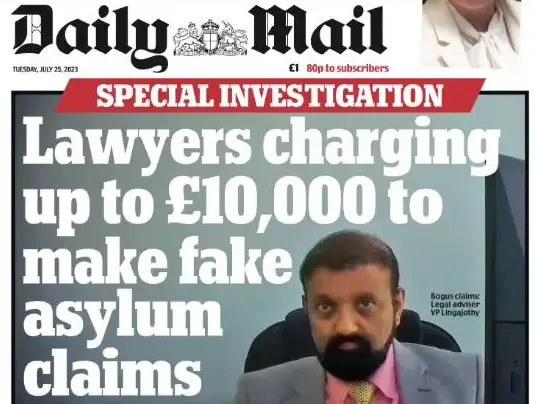
A British Journalism Award-nominated Daily Mail investigation that used undercover reporters acted in the public interest, press regulator IPSO has ruled.
The Daily Mail published its special investigation into immigration law firms, headlined “Lawyers charging up to £10,000 to make fake asylum claims”, on its front page on 25 July.
A second article published on the same day was headlined: “Don’t admit you came here to work – they will send you back’.”
The Mail reported that it had exposed lawyers “who charge between £4,000 and £10,000 for their services, invented elaborate fake stories to back up” false asylum and human rights claims.
Investigations editor Tom Kelly and assistant investigations editor Izzy Lyons were finalists for the Investigation of the Year category at the British Journalism Awards in December for their work, carried out with two freelance journalists who went undercover.
Rashid Khan, a solicitor who was filmed in a meeting with undercover reporters and quoted and pictured in the articles, complained to IPSO that the level of subterfuge used was unjustified.
In response, the Mail said it had been “essential for it to use subterfuge and misrepresentation in order to carry out its investigation into solicitors’ firms engaging in serious impropriety regarding asylum law, which was clearly of significant public interest”.
It added that “there had been no alternative means by which the necessary information could be obtained: lawyer-client discussions were privileged and confidential, and without the involvement of a first-party to these discussions, it would have been unable to uncover the scope and nature of the advice the complainant was giving to his clients”.
As the information provided by a source involved potentially illegal activity, Khan was “highly unlikely to have ‘shown his hand’ if approached openly and directly”, it went on.
The Mail was also able to provide internal memos written by investigations editor Kelly showing it had assessed whether its planned sting would meet the terms of Clause 10 (Clandestine devices and subterfuge) of the Editors’ Code of Practice, which says engaging in misrepresentation or subterfuge “can generally be justified only in the public interest and then only when the material cannot be obtained by other means”.
IPSO’s complaints committee agreed with the Mail, saying: “Given that the investigation had the potential to uncover evidence that the complainant was engaging in behaviour which might contravene the law as well as the Solicitors’ Code of Conduct, there was a clear public interest in verifying the claims made by the source and establishing the nature and scope of the advice the complainant was providing to his clients.”
The regulator also said it was reasonable for the Mail to believe it would not have been able to ascertain Khan’s true advice to clients without employing subterfuge and misrepresentation.
“The Committee noted that the subterfuge had been extensive, however – given the nature of the services that the complainant provided – the Committee considered that the publication had demonstrated that the use of undercover reporter was proportionate to the public interest served, as the information could not have been otherwise obtained.”
Filming Khan was justified, it said, because it “both enabled to publication to keep a record of the interaction – a crucial part of ensuring that matters are correctly reported, and which is of vital importance when reporting on matters in the public interest – and the publication of limited portions of the video served to illustrate a matter of public interest to the article’s readers”.
It therefore ruled there was no breach of Clause 10 of the code.
Khan, who had been contacted for comment and given an explanation about what had taken place 15 days before publication, also complained the articles were inaccurate and misleading and misrepresented the advice he had given, taking it out of context.
However this part of the complaint was also dismissed by IPSO.

Email pged@pressgazette.co.uk to point out mistakes, provide story tips or send in a letter for publication on our "Letters Page" blog
